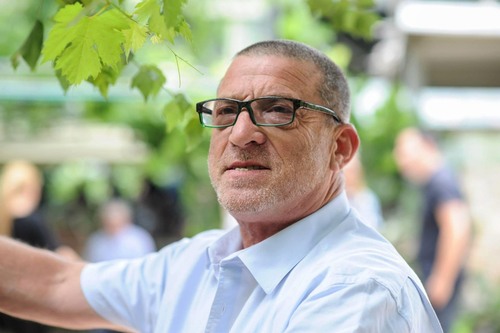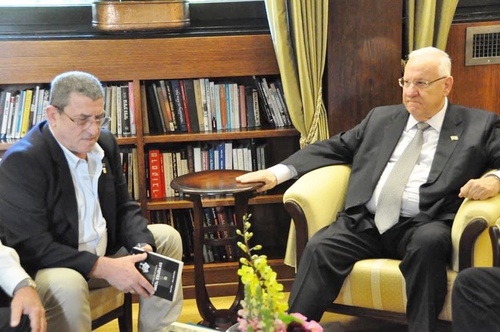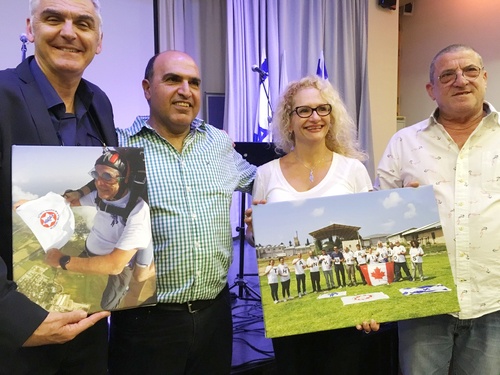
Sergeant Major Uri Ehrenfeld knows firsthand what it is like to be separated from family and friends for an indefinite time. He has spent the last five decades and, more recently, the past few months, doing all he can to help others overcome feelings of uncertainty and powerlessness.
Jerusalem-born Uri enlisted in 1971, serving with the elite Nahal Paratroopers. Mere hours before the Yom Kippur war broke out, Uri and his unit embarked on a mission near the Suez Canal.
From the very beginning, Uri says it was “a fight for survival.” The Israeli stronghold was rocked by artillery fire and attacked by a non-stop wave of Egyptian forces. Friends were killed by his side. During the war’s devastating first days, although injured by shrapnel and suffering burns to most of his body, Uri continued to fight. He felt as if he was trapped in a “box of fire”.
On October 13, 1973, rescue and reinforcements were impossible and ammunition was running out. The Israelis were overwhelmed by the enemy. On direct orders from Moshe Dayan, then-Minister of Defense, Uri and his unit surrendered to the Egyptians.
The injuries sustained in battle paled in comparison to what Uri experienced in captivity. He endured solitary confinement, nearly the entire time in the dark, as well as prolonged physical torture. Broken bones and burns were inflicted, but the most lasting damage was caused by the ongoing mental torment. While it took many forms, Uri recalls the humiliation of being marched back to the Israeli base, forced to lower Israel’s flag, replace it with Egypt’s, and made to salute it, as one of the worst experiences of his life.
The 20-year-old Uri struggled to cope with the indignities, hunger, fear, torture, and lack of control over his life. He swore, if he survived, he would help other veterans overcome their emotional injuries.
After two months of captivity, Uri was freed with other prisoners. Shortly after his arrival in Israel, Uri underwent intensive rehabilitation at Beit Halochem Jerusalem. Hundreds of pieces of shrapnel remain in his body and, over the years, he has spent 1,500 days in hospital to address ongoing issues caused by their presence. Uri held several command positions in Israel and abroad as he continued to serve his country during a 25-year career.
“Quarantine does not frighten me. I’ve experienced far worse isolation as a POW.”
Post-retirement, Uri served as assistant director of Beit Halochem Jerusalem, created support groups for ex-POWs, and co-drafted Israel’s national POW Law. In 2017, with funding from Beit Halochem Canada, Uri started Beit Halochem Jerusalem’s PTSD group to assist veterans suffering the mental trauma of Post-Traumatic Stress Disorder. Understanding that a veteran’s injury affects the entire family, a spouses’ group was also established. Under Uri’s direction, this vital program has now expanded to other Beit Halochem Centres.

President Reuven Rivlin is moved by hearing of Uri’s traumatic experiences while in captivity.
COVID-19 forced the temporary, first-ever closures of all Beit Halochem Centres. With a day’s notice, members were cut off from their “second homes”. Uri immediately implemented a 24-hour online chat room for the PTSD group, as well as mobilizing its members to pack and deliver food hampers, along with protective gear and books to now-isolated disabled veterans. The married father of three sons, grandfather of four, practicing glass artist, and author of several books that focus on his POW experiences always finds the time to ensure the well-being of others.
With your help, Beit Halochem Canada, Aid to Disabled Veterans of Israel can continue its commitment of rehabilitating, rebuilding, and enhancing the lives of more than 50,000 Israelis who have become disabled in the line of duty.
Beit Halochem is the only organization that takes care of Israel’s wounded veterans from the time they are injured and for the rest of their lives.
State-of-the-art Beit Halochem Centres in Jerusalem, Tel Aviv, Haifa, Beer Sheva, Nahariya, and the future Ashdod provide outstanding rehabilitative services, including physiotherapy, hydrotherapy, specialized sports equipment and training, creative and cultural activities, academic and athletic scholarships, and family programming.
Israel is a symbol of democracy, spirit, and security for the Jewish people. However, its extraordinary accomplishments come with a high price. Through unending acts of terror, the number of injured Israeli veterans continues to rise.
Your support ensures our ongoing success in helping these men and women reclaim their lives. Your donation to Beit Halochem Canada, Aid to Disabled Veterans of Israel acknowledges the great sacrifices injured Heroes, like Uri, have made and continue to make on our behalf.

Uri thanks Beit Halochem Canada for its founding and ongoing support of the PTSD program.
